| Srl | Item |
| 1 |
ID:
133777
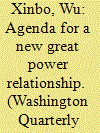

|
|
|
|
|
| Publication |
2014.
|
| Summary/Abstract |
Well begun is half done," Aristotle once said, meaning that beginning a project well makes it easier to do the rest. Yet, this may not be true of China-U.S. relations during Obama's presidency. Although the Obama administration secured a smooth transition from the George W. Bush years and attached high priority to relations with China during its first year in office, bilateral relations turned downward over the rest of Obama's first term, leaving a legacy of growing mutual suspicion and rising competition between the two countries, especially in the Asia-Pacific region. In spite of the November 2009 bilateral agreement to build a "positive, cooperative, and comprehensive relationship,"1 the two sides missed opportunities for more cooperation while mishandling and even misguiding bilateral ties on some points.
|
|
|
|
|
|
|
|
|
|
|
|
|
|
|
|
| 2 |
ID:
153120
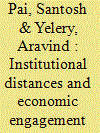

|
|
|
|
|
| Summary/Abstract |
This article argues that bridging institutional distance is a reliable method to increase the flow of Chinese
investments into India. India’s growing economy and ability to attract investments from China meets most
of the conditions that can be considered attractive for investments from China. This is complemented by
China also fulfilling many of the criteria as a source of foreign direct investment (FDI) into India. China
is a major trading partner of India but the Indian economy remains highly deficient in Chinese investment
which undermines reciprocity in economic affairs. The possible reasons for underinvestment by Chinese
enterprises in India are partly associated with the lack of sufficient interactions between institutions of
both the countries, which in turn creates ‘institutional distances’ impacting economic affairs. This article
attempts to throw light on these issues from theoretical and behavioural perspectives. Apart from instances
of ‘institutional differences’, the article will also attempt to address how select ministries in China and
India function while dealing with each other on a case by case basis.
|
|
|
|
|
|
|
|
|
|
|
|
|
|
|
|
| 3 |
ID:
139045
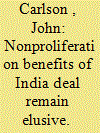

|
|
|
|
|
| Summary/Abstract |
In 2005 the Bush administration decided to normalize India’s participation in international nuclear cooperation. In a joint statement with Indian Prime Minister Manmohan Singh, President George W. Bush announced that he would work to achieve full civil nuclear energy cooperation with India.[1] Singh affirmed that India was “ready to assume the same responsibilities and practices and acquire the same benefits and advantages as other leading countries with advanced nuclear technology, such as the United States,” and announced a number of nonproliferation and disarmament commitments.
|
|
|
|
|
|
|
|
|
|
|
|
|
|
|
|
| 4 |
ID:
147522
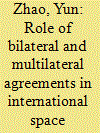

|
|
|
|
|
| Summary/Abstract |
International cooperation has been successfully conducted in a wide range of areas in the space field. Over the past years, many bilateral and multilateral agreements have been concluded, providing solid legal basis for space cooperation. This article examines the important role of these agreements in the process of international space cooperation and put forward suggestions on how to further facilitate the conclusion of international agreements so that international space cooperation can be carried out more effectively. The article concludes that international agreements are important tools to realize international space cooperation and that we will need to further study possible means to promote international space cooperation in wider scope through the conclusion of international agreements.
|
|
|
|
|
|
|
|
|
|
|
|
|
|
|
|
| 5 |
ID:
164203
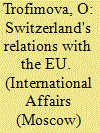

|
|
|
|
|
| Summary/Abstract |
SWITZERLAND holds a special place in Europe. It has one of the world's most stable and competitive economies, which uses the cluster model of organization and is based on sectors that have traditionally given competitive advantages to Switzerland such as high-tech industries, including the manufacturing of watches and precision machinery, the pharmaceutical industry, the manufacturing of some food products, and the service sector. Switzerland owes these advantages to customization for specific clienteles, to a relatively large share of capital-intensive and high-tech products in its total output, to high-standard after-sales service, to its convenient geographical location, and to the effective use of resources, and to the Swiss national character with its self-discipline and sense of responsibility. Switzerland's best-performing sectors are industries that need skilled labor and relatively low inputs of raw materials, and are chiefly export-oriented.
|
|
|
|
|
|
|
|
|
|
|
|
|
|
|
|
| 6 |
ID:
130190
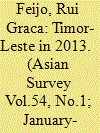

|
|
|
|
|
| Publication |
2014.
|
| Summary/Abstract |
In early 2013, Timor-Leste started to walk solely on its own feet, after the departure of the United Nations Integrated Mission in Timor-Leste and the International Stabilization Force. The year has proved to be broadly peaceful, signifying that the country has learned to live within its own resources. The level of political consensus has increased, as Timor-Leste engages in a process of generational turnover.
|
|
|
|
|
|
|
|
|
|
|
|
|
|
|
|
| 7 |
ID:
193596
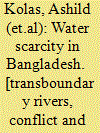

|
|
|
|
|
| Publication |
Norway, PRIO, 2013.
|
| Description |
136p.pbk
|
| Standard Number |
9788272884856
|
|
|
|
|
|
|
|
|
|
|
|
Copies: C:1/I:0,R:0,Q:0
Circulation
| Accession# | Call# | Current Location | Status | Policy | Location |
| 060497 | 333.9105492/KOL 060497 | Main | On Shelf | General | |
|
|
|
|